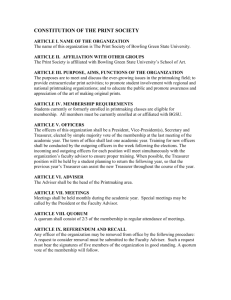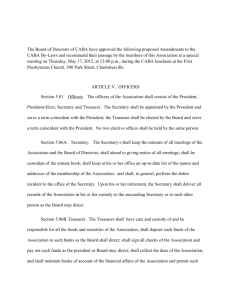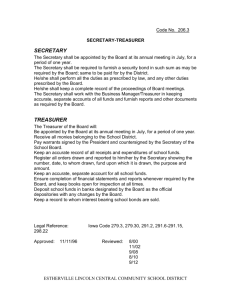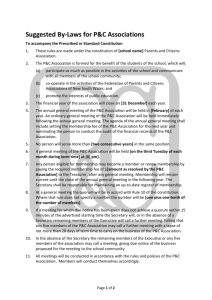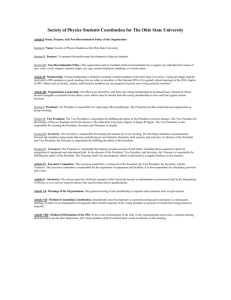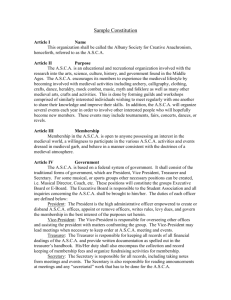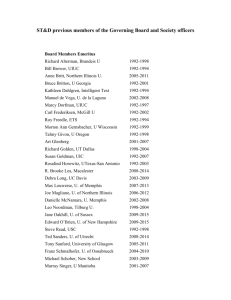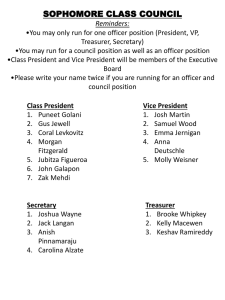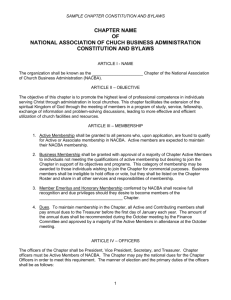SAFCALD Constitution
advertisement
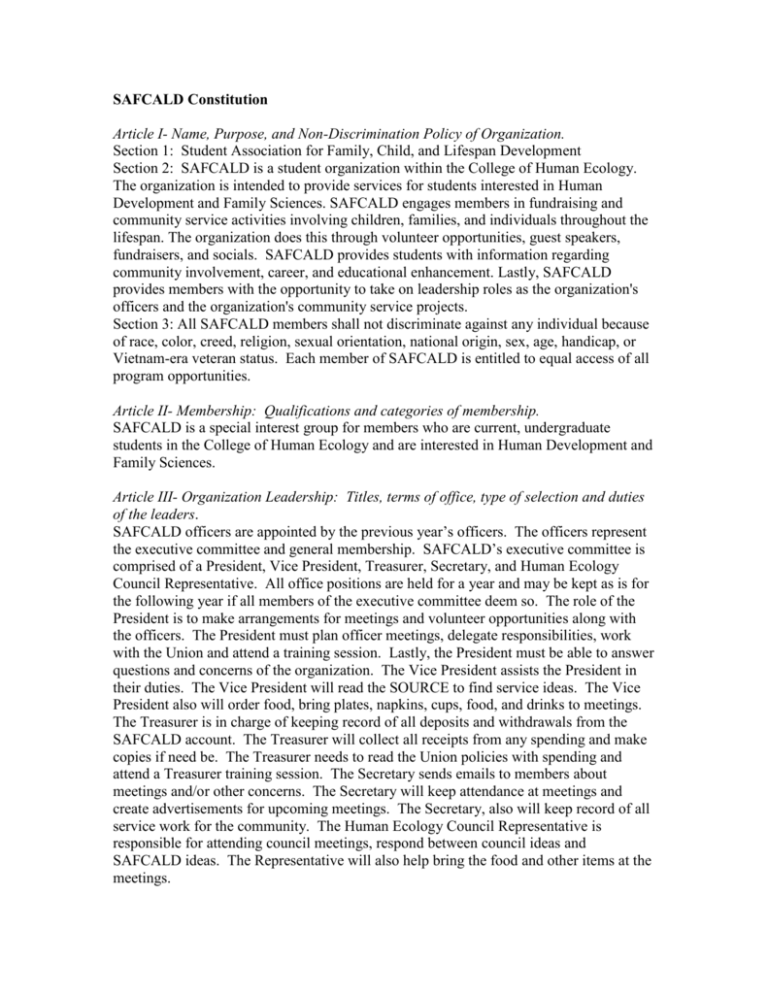
SAFCALD Constitution Article I- Name, Purpose, and Non-Discrimination Policy of Organization. Section 1: Student Association for Family, Child, and Lifespan Development Section 2: SAFCALD is a student organization within the College of Human Ecology. The organization is intended to provide services for students interested in Human Development and Family Sciences. SAFCALD engages members in fundraising and community service activities involving children, families, and individuals throughout the lifespan. The organization does this through volunteer opportunities, guest speakers, fundraisers, and socials. SAFCALD provides students with information regarding community involvement, career, and educational enhancement. Lastly, SAFCALD provides members with the opportunity to take on leadership roles as the organization's officers and the organization's community service projects. Section 3: All SAFCALD members shall not discriminate against any individual because of race, color, creed, religion, sexual orientation, national origin, sex, age, handicap, or Vietnam-era veteran status. Each member of SAFCALD is entitled to equal access of all program opportunities. Article II- Membership: Qualifications and categories of membership. SAFCALD is a special interest group for members who are current, undergraduate students in the College of Human Ecology and are interested in Human Development and Family Sciences. Article III- Organization Leadership: Titles, terms of office, type of selection and duties of the leaders. SAFCALD officers are appointed by the previous year’s officers. The officers represent the executive committee and general membership. SAFCALD’s executive committee is comprised of a President, Vice President, Treasurer, Secretary, and Human Ecology Council Representative. All office positions are held for a year and may be kept as is for the following year if all members of the executive committee deem so. The role of the President is to make arrangements for meetings and volunteer opportunities along with the officers. The President must plan officer meetings, delegate responsibilities, work with the Union and attend a training session. Lastly, the President must be able to answer questions and concerns of the organization. The Vice President assists the President in their duties. The Vice President will read the SOURCE to find service ideas. The Vice President also will order food, bring plates, napkins, cups, food, and drinks to meetings. The Treasurer is in charge of keeping record of all deposits and withdrawals from the SAFCALD account. The Treasurer will collect all receipts from any spending and make copies if need be. The Treasurer needs to read the Union policies with spending and attend a Treasurer training session. The Secretary sends emails to members about meetings and/or other concerns. The Secretary will keep attendance at meetings and create advertisements for upcoming meetings. The Secretary, also will keep record of all service work for the community. The Human Ecology Council Representative is responsible for attending council meetings, respond between council ideas and SAFCALD ideas. The Representative will also help bring the food and other items at the meetings. Aricle IV- Adviser. Dr. Eugene Folden is SAFCALD’s adviser and is a full-time member of the Univeristy faculty. As the Adviser, Dr. Folden is responsible for overseeing the organization, providing volunteer project ideas, and is liaison between SAFCALD and the Human Ecology faculty. Article V- Meetings of the Organization: Required meetings and their frequency. Two to three meetings will be held each quarter, excluding summer. All meetings are required for office holders, but not for other members. Attendance will be highly encourage though for general membership. Article VI- Method of Amending Constitution: Proposals, notice, and voting requirements. Proposed amendments must be in writing and will not be acted upon, but read in a general meeting in which they are proposed. The proposed amendment shall be read again in a number of following general meetings. At each general meeting a vote will be taken, requiring either a two-third or three-quarter majority of the voting population or a majority or two-thirds of the entire voting membership of SAFCALD, present or not. Article VII- Method of Dissolution of Organization. Shall the dissolution of SAFCALD occur, the Union must be notified immediately and all members must be notified in the next meeting. Any debt shall be paid off promptly, and all money members have paid that has not been put to use shall be returned. By-Laws Article 1- Parlimentary Authority The rules contained in SAFCALD’s executive committee shall govern the organization in all cases to which they are applicable, and in which they are not inconsistent with the bylaws of this organization. Article II- Membership All individuals who wish to become a member of SAFCALD must be a part of the College of Human Ecology, interested in Human Development and Family Sciences, attend regular group meetings, and pay $30 in dues once. If termination of membership arise, the executive committee must comprise a list of why one shall be terminated. A vote will then be held. If the vote meets all requirements and majority wins, then the member shall be terminated. Article III- Election/Appointment of Government Leadership An election for office positions will be held in the first meeting of spring quarter to gain an idea of who would like to run for a position. Each member wishing to run for office will be given a form of questions asking the candidate to asses their leadership skills and how they might help SAFCALD. Decisions will be made by current officers. The running member will be officially elected at the last meeting of spring quarter. Eligibility will be based on attendance of group meetings, ideas for community service projects, persona, and leadership qualities. There must be a majority of current office members who believe the candidate will be best for the open position. If a office holder resigns, the next, lower position of power will move up into office. The lowest office position will then be open, and a vote will be casted to elect the next officer. If impeachment shall occur, the same procedure will follow. Article IV- Executive Committee SAFCALD’s executive committee is comprised of a President, Vice President, Treasurer, Secretary, and Human Ecology Council Representative. All office positions are held for a year and may be kept as is for the following year if all members of the executive committee deem so. The role of the President is to make arrangements for meetings and volunteer opportunities along with the officers. The President must plan officer meetings, delegate responsibilities, work with the Union and attend a training session. Lastly, the President must be able to answer questions and concerns of the organization. The Vice President assists the President in their duties. The Vice President will read the SOURCE to find service ideas. The Vice President also will order food, bring plates, napkins, cups, food, and drinks to meetings. The Treasurer is in charge of keeping record of all deposits and withdrawals from the SAFCALD account. The Treasurer will collect all receipts from any spending and make copies if need be. The Treasurer needs to read the Union policies with spending and attend a Treasurer training session. The Secretary sends emails to members about meetings and/or other concerns. The Secretary will keep attendance at meetings and create advertisements for upcoming meetings. The Secretary, also will keep record of all service work for the community. The Human Ecology Council Representative is responsible for attending council meetings, respond between council ideas and SAFCALD ideas. The Representative will also help bring the food and other items at the meetings. Article V- Adviser Responsibilities Dr. Eugene Folden is SAFCALD’s adviser and is a full-time member of the Univeristy faculty. As the Adviser, Dr. Folden is responsible for overseeing the organization, providing volunteer project ideas, and is liaison between SAFCALD and the Human Ecology faculty. Article VI- Meeting Requirements Two to three meetings will be held each quarter, excluding summer. If a decision needs to be voted on, the group must take the average number of members who usually attend meetings. The average number of people must be present to take part in the vote. Article VII- Method of Amending By-Laws By-Laws may be amended by proposing in writing and reading the change during a general organizational meeting. The proposed change must be voted on at the next general group meeting with a two-thirds majority vote of the members present.
